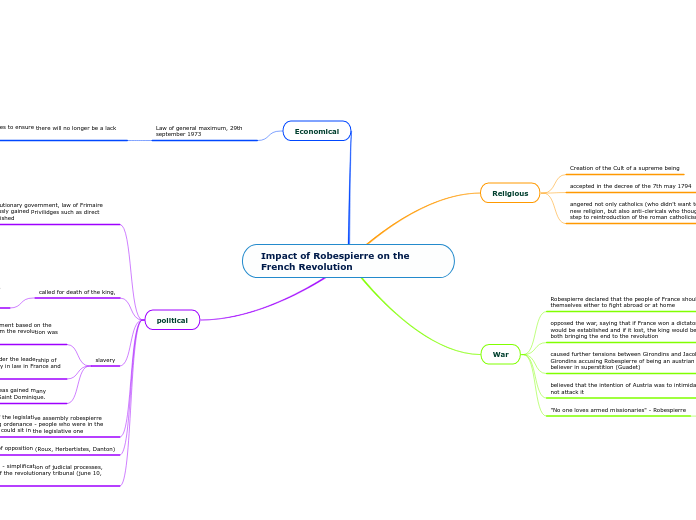Impact of Robespierre on the French Revolution
Religious
Creation of the Cult of a supreme being
accepted in the decree of the 7th may 1794
angered not only catholics (who didn't want to subject to a new religion, but also anti-clericals who thought it was the first step to reintroduction of the roman catholicism
War
Robespierre declared that the people of France should arm themselves either to fight abroad or at home
opposed the war, saying that if France won a dictatorship would be established and if it lost, the king would be restored, both bringing the end to the revolution
caused further tensions between Girondins and Jacobins, with Girondins accusing Robespierre of being an austrian agent and believer in superstition (Guadet)
believed that the intention of Austria was to intimidate France not attack it
"No one loves armed missionaries" - Robespierre
-> foreigners would not rise in favor of the french revolution
Economical
Law of general maximum, 29th september 1973
set prices and wages to ensure there will no longer be a lack of supply of food
political
reign of terror - revolutionary government, law of Frimaire causing many previously gained privilidges such as direct democracy to be abolished
The CPS - joined on 27th july 1793, was a link between sans-cullotes and the middle class Jacobins
"Revolutionary Government … has no room for anarchy and disorder. It is not directed by individual feelings, but by the public interest. It is necessary to navigate between two
rocks; weakness and boldness, reaction and extremism." - Robespierre
Caused the anger of many, because the political rights they have just gained were already abolished
supported the insurrection against the girondins,which lead to their expulsion from the assembly
called for death of the king,
the decision to kill the king was impacted by his speeches, because he was one of the leading figures of the Jacobin club and had enough authority to change the opinion of those undecided.
slavery
Robespierre spoke against unequal treatment based on the skin color, which reminded him of serfdom the revolution was so deeply against
"Ask a merchant of human flesh what is property; he will answer by showing you that long coffin he calls a ship... Ask a gentleman [the same] who has lands and vassals... and he will give you almost the identical ideas." - Robespierre
The convention on 4 February 1794, under the leadership of Maximilien Robespierre, abolished slavery in law in France and its colonies.
Because of this the revolution and it's ideas gained many supporters in the colonies, for example Saint Dominique.
before the creation of the legislative assembly robespierre proposed self-denying ordenance - people who were in the constituent assembly could sit in the legislative one
this lead to the assembly to not be dominated by his opponents, allowing the followers of Robespierre to still have significant political power
Elimination of opposition (Roux, Herbertistes, Danton)
The Law of 22 Prairial - simplification of judicial processes, extended the rights of the revolutionary tribunal (june 10, 1794)
